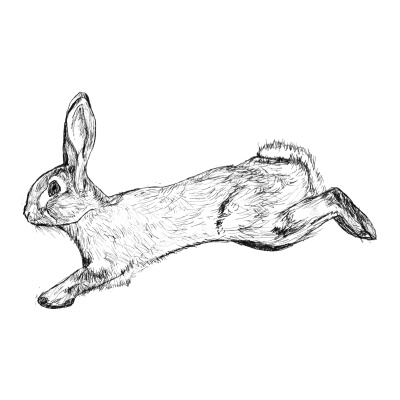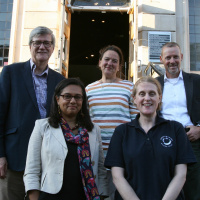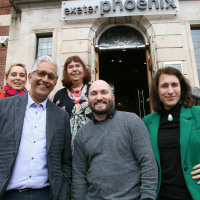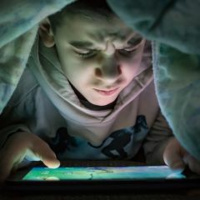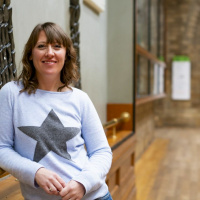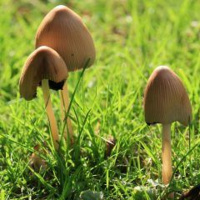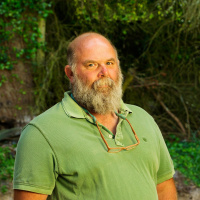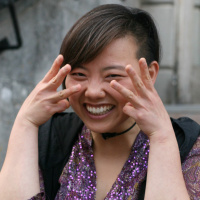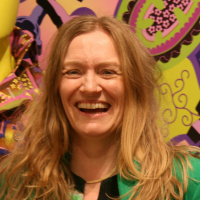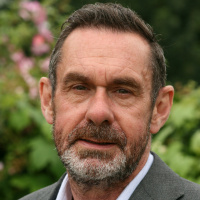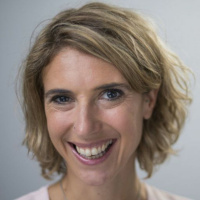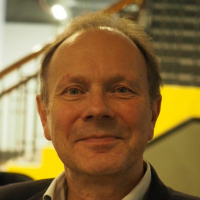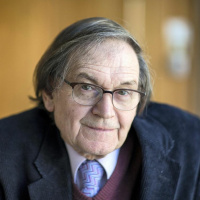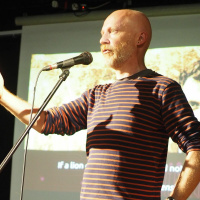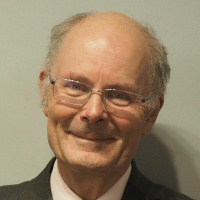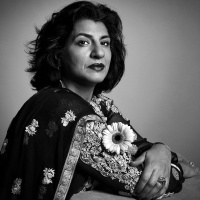Sinopsis
Agile Rabbit (www.agile-rabbit.com) is a platform that provides special events for the South-West and beyond to focus on ideas, global affairs and the natural and scientific world. The events are set in contrasting venues across the South-West to provide quirky experiences, which welcome conversation. There is a monthly talk and discussion at Exeter Phoenix, and other special events elsewhere including IntoBodmin and Marine Theatre Lyme Regis. The events include panel discussions, debates, film screenings, and performances. This diversity of experiences sets the tone of Agile Rabbit as inclusive, emphasising our key theme: That cutting edge thinking can be at the centre of everyday life.OriginLapin Agile is a cabaret in Montmartre, Paris. At the turn of the twentieth century artists, thinkers, and scientists would gather to discuss ideas and socialise.
Episodios
-
Water and Climate Change
29/06/2023 Duración: 50minThursday 22 June 2023 Exeter Phoenix Prof David Butler FREng, Professor Tania Kovats, Trevor Bishop, Dr Sarah Ward, Anu Anand Hear four speakers passionately discuss the implications of our changing world on a key area. Climate Change and water are intertwined, from flooding and drought, to increased demand and varying quality. We’re looking at the 10 key changes you need to know: what we are already experiencing, alongside what to expect in the coming years, and the positive ways scientists and engineers are building resilience. We’re sharing the research behind the headlines, with a particular focus on the work of the Centre for Water Systems at the University of Exeter. We’ll examine the science behind attribution; is there evidence that individual extreme flooding events were affected by Climate Change? How can we become more resilient in a changing world to extreme weather events and how does the artistic community work with scientists to communicate their work? This event is in partnership wi
-
Can I Trust Science?
27/04/2023 Duración: 55minCAN I TRUST SCIENCE? From anti-vaxxers to climate deniers, not everyone trusts science. A special live event with a panel of international experts to look at why there is mistrust and positive antidotes to deal with it. This discussion explores the Open Science movement, which is sweeping the globe promoting practices to make science more transparent and less biassed. One method is sharing data – that increases trust through openness and accelerates the quality of research. There are hurdles to sharing data: who owns it, how it’s arranged, and the motivation of scientists when their careers are driven by publishing results. But are there limitations, a tyranny of openness? Sharing data without acknowledgement or payment may lead to exploitation of those who produced it. The panel examines the ethics of data and share positive solutions to make science more responsible, so we can all trust it. TIMANDRA HARKNESS SABINA LEONELLI TRAVIS COAN CAROLE GOBLE CBE FRENG FBCS JAMES COOMARASAMY
-
How to Fix the Internet
17/02/2023 Duración: 59minA lively discussion with some of the world’s leading thinkers as we reassess our relationship with the internet and set out a positive vision of how it can be improved so we can reshape the digital world into a space where we can all flourish. In partnership with the Institute of Data Science and Artificial Intelligence at the University of Exeter HELEN MARGETTS OBE Director of the Public Policy Programme, Professor of Society and the Internet The Alan Turing Institute University of Oxford SILVIA MILANO Lecturer in Philosophy of Data and Data Ethics Institute for Data Science and Artificial Intelligence (IDSAI) University of Exeter CHICO CAMARGO Lecturer in Computer Science (E&R) Institute for Data Science and Artificial Intelligence (IDSAI) University of Exeter RITULA SHAH (CHAIR) Lead Presenter, The World Tonight BBC Radio 4
-
Dr Susannah Maidment | Why the Stegosaurus Has Plates
15/02/2023 Duración: 29minStegosaurs are a group of dinosaurs characterized by the possession of two rows of plates and spines that extend from the neck to the end of the tail. Join us for a live event with acclaimed scientist Dr Susannah Maidment from the Natural History Museum. Discover the function of the plates of stegosaurs. Were they for display or to deter predators?
-
The Psychedelic Renaissance
07/11/2022 Duración: 01h00sPsychedelic drugs are gaining attention in the pharmaceutical industry because of increasing scientific evidence of their potential benefits for people suffering with psychiatric disorders. Join world experts David Nutt, Dr David Erritzoe, Professor Christine Hauskeller, Dr Peter Sjöstedt-Hughes, and BBC host Ritula Shah to look at the medical, societal, and historical implications of these recent discoveries. This event was part of Futures 2022, recorded at Dartington Hall.
-
Derek Gow | Beavers & Rewilding
11/08/2022 Duración: 30minHear an inspirational and often riotously funny first-hand account of the movement to rewild the British landscape with beavers – and how it became the most subversive nature conservation act of the modern era. Since the early 1990s – in the face of opposition from government, landowners, and even some conservation professionals – Derek Gow has imported, quarantined and assisted the reestablishment of beavers in waterways across the UK. For 400 years they have been hunted to the point of extinction, cast as pests, enemies of landowners and destroyers of habitats. Their fur, oils, glands and meat helped build North America and fueled international trade. In recent years the beaver is making a dramatic and welcomed comeback. Beavers are being recognised as nature’s architects, whose dams help to filter water, stop run-off and reduce flooding, while also providing much needed habitat for a range of wetland wildlife. Held in high esteem by fellow rewilders, including Chris Packham and Isabella Tree, D
-
Dr Danbee Kim | A Musical Tour of Field Neuroscience
11/08/2022 Duración: 40minHow do we relate neuroscience research in laboratories to our experience of living? The goal of Field Neuroscience is to build a bridge between the two – it’s the non-invasive study of nervous systems “in the wild”. Neuroscientists study something that everyone uses every day to navigate the complexities of human society – their nervous system. Perhaps without even knowing it, everyone has a familiarity with the nervous system’s influence on their own behaviour and the behaviour of others. This gives neuroscience a unique and largely untapped potential compared to other sciences. Dr. Danbee “Tauntaun” Kim is a Korean-American neuroscientist and teacher who earned her BSc in Brain and Cognitive Sciences from MIT, where they also spent 10 years acting, directing, choreographing, costuming, and writing original content for the MIT Musical Theater Guild. While completing her PhD with Dr. Adam Kampff at the Champalimaud Neuroscience Program, Danbee authored a graphic novel version of their doctoral dissertation
-
The Future of AI
15/06/2022 Duración: 50minSHOLTHANA BEGUM Head of Regtech and Data Innovation Bank of England PETER CHALLENOR Institute for Data Science and Artificial Intelligence (IDSAI) University of Exeter TIM DODWELL Professor in Computational Mechanics Institute for Data Science and Artificial Intelligence (IDSAI) University of Exeter NOOR SHAKER CEO Glamorous AI RITULA SHAH (CHAIR) Lead Presenter, The World Tonight BBC Radio 4 AI is at a crucial point: in this event discover its radiant possibilities as well as the possible changes to all our lives. A world leading panel of experts from business, finance, media and academia discuss the eye-opening scenarios of our future. There is a particular focus on how AI is used to make models for our decisions, regulate our systems, and reduce the impact of uncertainty to solve real-world problems Which areas of our lives will have the most rapid changes? What does this tell us about what it means to be human? This event is in partnership with the University of Exeter Institute for Data Science
-
Professor Lee Elliot Major | 10 Ways to Help Your Child Do Well
06/02/2022 Duración: 28minHow can you help your children do well at school and beyond? Hear the top tips – and the evidence for them – in this special live event with Lee Elliot Major, the first professor of Social Mobility. He reveals what really matters in education, debunking myths and misconceptions that can harm children’s learning. Professor Eliot Major’s work helps parents to focus on the effective use of their time, which leads to better outcomes for children, but also a more balanced life. Based on the findings of thousands of studies alongside many personal parenting stories, we’ll examine how to empower children so they become independent thinkers ready to prosper in the world.
-
Professor Martha Clokie | Viruses that improve our health
06/12/2021 Duración: 29minWe think about viruses as harmful to us, but research by our speaker Martha Clokie shows that some can improve our health. These tiny viruses known as ‘phages’ do this by invading bacteria, multiplying, and bursting out, eventually destroying their host. When these are bacteria that attack our bodies, this could be beneficial—our enemy’s enemy is our friend. Antibiotic resistance is one of the biggest threats to global health. As a result, a growing number of infections—such as pneumonia, sepsis and diarrhoea—are harder to treat. Professor Martha Clokie is leading the fight against antibiotic resistant bacterial infections with this vital research. In particular, her work shows the potential for the use of phages against superbugs such as Clostridium difficile, Salmonella, and Borrelia (the causative agent of Lyme disease). In May 2019, headlines around the world told the story of the successful phage treatment of Isabelle Carnell-Holdaway, a sufferer of cystic fibrosis who contracted tuberculosis, who
-
Paul Mason | A Future Without Fascism
05/11/2021 Duración: 30minIn this event Paul Mason offers a radical, hopeful blueprint for resisting and defeating the new far right. It is both a chilling portrait of contemporary fascism – what fascists believe and how they operate today – and a compelling history of the fascist phenomenon: its psychological roots, political theories and genocidal logic. Fascism, Mason powerfully argues, is a symptom of capitalist failure, one that has haunted us throughout the twentieth century and into the twenty-first.
-
Dr Mark Freestone | Why are there fewer female psychopaths?
09/03/2020 Duración: 01minFind out what makes a psychopath, from the leading expert who helped to create Killing Eve’s Villanelle. Dr Mark Freestone has worked on some of the most interesting and infamous psychopath cases of recent times
-
Dr Mark Freestone | Is My Partner A Psychopath?
09/03/2020 Duración: 01minFind out what makes a psychopath, from the leading expert who helped to create Killing Eve’s Villanelle. Dr Mark Freestone has worked on some of the most interesting and infamous psychopath cases of recent times
-
Dr Mark Freestone | Making a Psychopath
09/03/2020 Duración: 39minFind out what makes a psychopath, from the leading expert who helped to create Killing Eve’s Villanelle. Dr Mark Freestone has worked on some of the most interesting and infamous psychopath cases of recent times. Exploring the many factors that make a psychopath, the complexities and contradictions of their emotions and behaviour, as well as an examination of how the lives of psychopaths develop inside and outside the institutions that treat them, this talk will open up a window into the world of those who operate outside of common human emotion.
-
Prof Karyn Morrissey | Health Inequalities & Climate Change
26/02/2020 Duración: 30minRecent headlines across the world declared that Climate Change is the “the biggest global health threat of the 21st century”—based on the Lancet Countdown on health and climate change published in November 2019. Its co-author joins us from the University of Exeter to discuss her vital work behind the story. The impacts of climate change are not felt equally. Those on low incomes—who are already more likely to have worse health—will suffer most from weather extremes, food shortages and flood damages, causing further health problems. Health inequalities in the UK are already stark. If you are born in parts of Glasgow, your life expectancy is 26 years less than someone born in Kensington & Chelsea. Across Western Europe life expectancy can vary by up to 10 years. In this timely talk—followed by audience questions and discussion—Professor Karyn Morrissey discusses the current health inequalities crisis and how climate change will bring our health systems to the brink. Karyn’s research is informing city leve
-
Julian Hector | Big Natural History Television & Conservation
26/02/2020 Duración: 30minOur speaker is head of the BBC Natural History Unit; founded in the 1950s as the first and biggest production unit of its kind, it is regarded as the world’s greatest maker of wildlife documentary films. Planet Earth, Frozen Planet, Life on Earth, and dozens more groundbreaking series were all delivered by this Bristol-based outfit. Julian Hector discusses the relationship between Natural History Television and the conservation of the natural world it depicts. Julian looks at the power of documentaries to move the public, change government policy, and inspire scientists across the world. This talk reveals special secrets and stories behind the making of documentaries, while charting their effect on our attitudes and behaviour to a natural world in crisis. Followed by Q & A Held in partnership with Two Short Nights film festival and the Global Systems Institute at the University of Exeter.
-
Sir Roger Penrose | Evaporating Black Holes & Hawkings Points
18/11/2019 Duración: 30minA new area of cosmology is the subject for the physicist, mathematician and philosopher of science, famous for many achievements, in particular his work with Stephen Hawking. This talk focuses on recent ground-breaking observations of anomalous points in the very early universe that appear to be sources of vast amounts of energy. These could have been produced by black holes evaporating before the Big Bang. Sir Roger will explain how this is new evidence that our universe is just one stage in a potentially infinite cycle of cosmic extinction and rebirth.
-
Prof Marcus du Sautoy | Creativity Code: How AI is learning to write, paint & think
15/11/2019 Duración: 30minSlides available here: glsr.it/creativitycode Will a computer ever compose a symphony, write a prize-winning novel, or paint a masterpiece? New developments in AI are shaking up the status quo, as we find out how many of the tasks humans engage in can be done equally well, if not better, by machines. But can machines be creative? In this talk, based on his bestselling book, Marcus du Sautoy examines the nature of creativity, as well as describing how algorithms work, and the mathematical rules underpinning them. He asks how much of our emotional response to art is a product of our brains reacting to pattern and structure, and exactly what it is to be creative in mathematics, art, language and music. Marcus finds out how long it might be before machines come up with something creative, and whether they might jolt us into being more imaginative in turn.
-
Why Brexit is Challenging Britain's Party Politics| Sir John Curtice
08/11/2019 Duración: 30minPoliticians assert that their views reflect the will of the British people, especially when it comes to Brexit. In this special talk, the President of the British Polling Council examines the evidence behind these claims. It takes place on the last day of the extension to Article 50. Professor John Curtice is the political scientist always at the centre of election night broadcasts for the BBC. He accurately predicted the results of the results in 2005, 2010, and 2015. Theresa May said that in pursuing Brexit she was delivering ‘the Brexit people voted for‘. Opponents of Brexit, often take the contrasting view that voters were misled during the EU referendum, and now that they are more aware of the supposed downsides of leaving the EU they should be given the chance to register their second thoughts in a second ballot. Professor Curtice examines the statistics behind both arguments.
-
The Extinction Rebellion Lawyer | Farhana Yamin
28/10/2019 Duración: 30minWhen police unglued Farhana Yamin from the forecourt of the Shell building—during recent climate protests—she became a figurehead of the Extinction Rebellion movement. The Climate Change lawyer appeared on front pages across the world and deftly handled interviews on programmes such as Newsnight. For this Agile Rabbit talk, Farhana argues that now is the time to rise up and rebel. Activism, she asserts, is key to affecting meaningful action that will combat Climate Change. Farhana’s work against Climate Change goes further back that recent protests. She worked on the Earth Summit in Rio in 1992, the Paris Agreement between 200 nations, and represents small island nations affected by Climate Change in international legal cases. There was hope that governments would follow scientific expertise when making long-term strategic policy. Farhana argues that governments’ resistance against real action makes activism necessary. Individual lifestyle adjustments make little difference, and governments must now lead—
